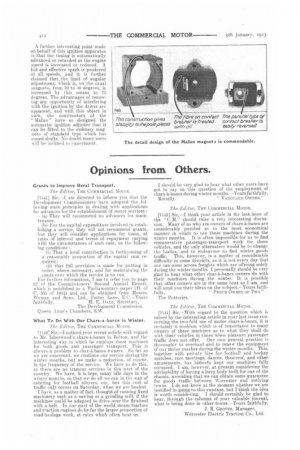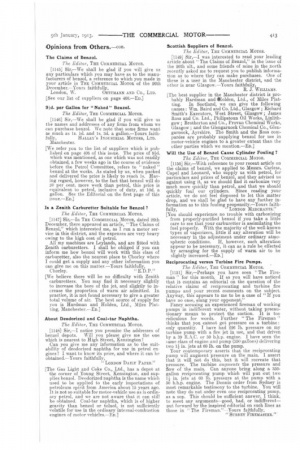Opinions from Others.
Page 14

Page 15

If you've noticed an error in this article please click here to report it so we can fix it.
Grants to Improve Rural Transport.
The Editor, THE COMMERCIAL MOTOR.
[,1 I-11] Sir,—I am directed to inform you that the Development Commissioners have adopted the following main principles in dealing with applications for advances for the establishment of motor services : (a) They will recommend no advances for maintenance.
(b) For the capital expenditure involved in establishing a service, they will not recommend grants, but they will consider applications for loans, at rates of interest and terms of repayment varying with the circumstances of each case, on the following conditions : (i) That a local contribution is forthcoming of a reasonable proportion of the capital sum required ; (ii) that full provision is made for putting in order, where necessary, and for maintaining the roads over which the service is to run,
For -bother information, I am to refer you to page 3=2 of the Commissioners' Second Annual Report. which is published as a Parliamentary paper (H. of C. 305 of 191=2) and can be obtained from Messrs. Wyman and Sons, Ltd., Fetter Lane, E.C.—Yours
faith fully, H. E. DALE, Secretary, The Development Commission. Queen Anne's Chambers, S.W.
What To Do With Our Chars-a=barcs in Winter.
The Editor, THE COMMERCIAL MOTOR.
111421 Sir,—I noticed your recent article with regard to Mr. Isherwood's chars-&-bancs in Bolton, and the interesting way in which he employs these machines for both goods and passenger . transport. This is always a problem to char-k-bancs owners. So far as we are concerned, we continue our service during the winter months, but we make a reduction, of course, in the frequency of the service. We have to do this, as there are no tramcar services in this part of the country. We have, it is true, many idle days in the winter months, so that we do all we can in the way of catering for football nlayers, etc., but this sort of traffic only occurs on Saturday, when we are busiest.
I have, as a matter of fact, thought of running fixed machinery such as a sawing or a grinding mill, if the machinescould be adapted to drive over the flywheel with a belt. In our part of the world steam tractors and tsaction engines do by far the larger proportion of road-haulage work, at rates which often beat us. I should be very glad to hear what other users have got to say on this question of the employment of chars-à-bancs during winter months.—Yours faithfully, Rossilly. " VANGUARD OWNER."
The Editor, THE COMMERCIAL MOTOR.
[1143] Sir,—I think your article in the last issue of the " C.M." should raise a very interesting discussion. Many of us who are owners of chars-asbancs are considerably puzzled as to the most economical manner in which to use these machines during the winter months. It is often impossible for us to find remunerative passenger-transport work for these vehicles, and the only alternative would be to change the bodies, and to endeavour to find winter goods traffic. This, however, is a. matter of considerable difficulty in some districts, as it is not every day that one can come across freights which are offering solely during the winter months. I personally should be very glad to hear what other char-k-bancs owners do with their machines during the winter. It is possible that other owners are in the same boat as I am, and will send you their ideas on the subject --Yours faith fully, "PROUD OWNER OF Two." The Potteries.
The Editor, THE, COMMERCIAL MOTOR.
[1144] Sir,—With regard to the question which is raised by the interesting article in your last issue concerning the two-fold use of motor chars-k-bancs, it is certainly a, problem which is of importance to many owners of these machines as to what they shall do with their vehicles in times when pleasure passenger traffic does not offer. Our own general practice is thoroughly to overhaul and to renew the equipment of our motor coaches during the winter months. This, together with private hire for football and hockey matches, race meetings, dances, theatres( and other amusements, has hitherto kept our machines fully occupied. I am, however, at present considering the advisability of having a lorry body built for one of the chassis, providing that we can obtain some guarantee for goods traffic between Worcester and outlying towns. I dq not. know at the moment whether we are justified in going to this expense, but I think the idea is worth considering. I should certainly be glad to hear, through the columns of your valuable journal, what is being done in other towns.—Yours faithfully, J. R. GROVES, Manager, Worcester Electric Traction Co.. Ltd. The Claims of Benzol.
The Editor, THE COMMERCIAL MOTOR.
[1145] Sir,—We shall be glad if you will give us any particulars which you may have as to the manufacturers of benzol, a reference to which you made in your article in THE COMMERCIAL MOTOR of the 26th December—Yours faithfully, London, W. OETZMANN AD CO., LTD. [See our list of suppliers on page 408.—ED.] 9id. per Gallon for "Naked" Benzol.
The Editor, THE COMMERCIAL MOTOR.
[1146] Sir,—We shall be glad if you will give us the names and addresses of any firms from whom we can purchase benzol. We note that some firms want as much as ls. Id, and is. 3d. a gallon.—Yours faith fully, HALLEY'S INDUSTRIAL MOTORS, LTD. Manchester.
[We refer you to the list of suppliers which is published on page 408 of this issue, The price of W. which was mentioned, as one which was not readily obtained, a few weeks ago in the course of evidenee before the Petrol Committee, refers to "naked " benzol at the works. As stated by us, when packed and delivered the price is likely to reach is. Having regard, however, to the fact that benzol will do 20 per cent. more work than petrol, this price is equivalent to petrol, inclusive of duty, at 10d. a gallon. See the Editorial on the first page of this issue.—En.] ls a Zenith Carburetter Suitable for Benzol?
The Editor, THE COMMERCIAL MOTOR.
[1147) Sir,—In THE COMMERCIAL MOTOR, dated .ciath December, there appeared an article, 'The Claims of Benzol," which interested me, as I run a motor service in this district, and the expenses are very heavy owing to the high cost of petrol.
All my machines are Leylands, and are fitted with Zenith carburetters. I shall be obliged if you can inform me how benzol will work with this class of carburetter, also the nearest place to Chorley where I could get a supply and any other information you can give me on this matter.—Yours faithfully, Chorley_ [We believe there will be no difficulty with Zenith carburetters. You may find it necessary slightly to increase the bore of the jet, and slightly to increase the proportion of warm air admitted. In practice, it is not found necessary to give a greater total volume of air. The best source of supply for you is Hardman and Holden, Ltd., Miles Platting, Manchester.—En.] About Deodorized and Coal-tar Naphtha.
The Editor, THE COMMERCIAL MOTOR.
[1148] Sir,—I notice you promise the addresses of benzol depots. Will you please give me the one which is nearest to High Street, Kensington ?
Can you give me any information as to the suitability of deodorized naphtha for use in petrol engines? I want to know its price, and where it can be obtained.—Yours faithfully,
" LONDON DAILY PAPER."
The Gas Light and Coke Co., Ltd., has a depot at the corner of Young Street, Kensington, and supplies benzol. Deodorized naphtha is the name which used to be applied to the early importations of petroleum spirit from America about 15 years ago. It is not so suitable for motor-vehicle use as is ordinary petrol, and we are not aware that it can still be obtained. Coal-tar naphtha, which is of higher gravity than benzol or toluol, is not sufficiently volatile for use in the ordinary internal-combustion engines of motor vehicles.—En.] Scottish Suppliers of Benzol.
The Editor, TEE COMMERCIAL MOTOR.
[1149] Sir,—I was interested to read your leading article about " The Claims of Benzol," in the issue of the 26th ult., and some friends of mine in the north recently asked me to request you to publish information as to where they can make purchases. One of these is a user in the Manchester district, and the other is near Glasgow.—Yours faithfully, R. J. Winiasis.
[The best supplier in the Manchester district is probably Hardman and lolden, Ltd., of Miles Plat
ting. In Sootland, we can give the following names : leYsa. Baird and Co_ Ltd., Glasgow ; Richard Smith's Executors, West Street, Glasgow; James Ross and Co. Ltd., Philipstoun Oil Works, Linlithgow; Brotherton and Co., Provan Chemical Works, Glasgow ; and the Glengarnock Chemical Co., Glengarnock, Ayrshire. The Smith and the Ross companies are probably supplying benzol for use in motor-vehicle engines to a greater extent than the other parties which we mention.—ED.] Will the Use of Benzol Cause Cylinder Fouling ? The Editor, TEE COMMERCIAL MOTOR.
[1150] Sir,—With reference to your recent article on the claims of benzol, we applied to Messrs. Carless, Capel and Leonard, who supply us with petrol, for particulars and prices of benzoI, and they advised us against using it, as we should find it carbonize very much more quickly than petrol, and that we should quickly foul our cylinders. Since reading your article, we do not feel disposed to let this matter drop, and we shall be glad to have any further information as to this fouling propensity._—Yours faith
fully, " LONDON Pd.ERCHANTS." [You should experience no trouble with carbonizing
from properly-purified benzol if you take a little care to see that your carburetter is assimilating the fuel properly. With the majority of the well-known types of vaporizers, little if any alteration will be necessary in the adjustment under ordinary atmospheric conditions. If, however, such alteration appear to be necessary, it can as a rule be effected by arranging for the supply of warm air to be slightly increased.—En.] Reciprocating versus Turbine Fire Pumps.
The Editor, THE COMMERCIAL Moms.
[1151] Sir,—Perhaps you have seen "The Fireman" for this month. If so you will have noticed that it contains a,n editorial on the question of the relative claimr of reciprocating and turbine fire pumps and your recent comments on the subject. Anyway, this appears to me to be a case of "If you have no case, slang your opponent."
Fancy accusing an experienced fireman of working pumps in indifferent water, without taking precautionary means to protect the suction. It is too ridiculous for words. Further "The Fireman thinks that you cannot get pressure on a turbine : only quantity. I have had 226 lb. pressure on my turbine pump with a fire jet in use, and that driven by a 39 B. .\.C. or 50 b.h.p. engine. I have seen the same class of engine and pump (350 gallons) delivering two lj in. jets at 60 lb. on the pump. Your coatemporary asserts that the reciprocating pump will augment pressure on the main. I assert that it will not do this, but it will recreate that pressure. The turbine augments the pressure and flow of the main. Can anyone bring along a 350gallon reciprocating pump which will put out two
in. jets at 60 lb. pressure at the pump with a 50 b,h.p. engine. The Dennis order from Sydney is most remarkable testimony to the turbine. You will note they do not order even one reciprocating pump, as a sop. This should be sufficient answer, I think, to meet any arguments—good, bad, or indifferent— put forward by the inspired editorial on such lines as those in " The Fireman."—Yours faithfully,
" SURREY FIREMASTER."




















